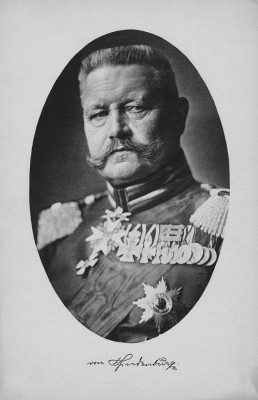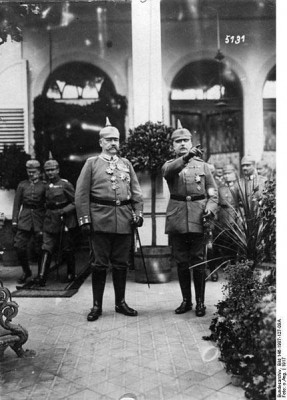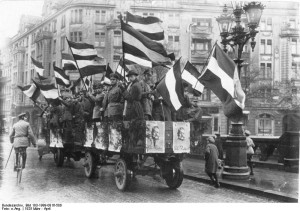Paul von Hindenburg played a major role in the history of the German military. As a military commander and field marshal in World War I, a political figure, and the second president of the Weimar Republic, Hindenburg had a strong hand in the shaping of Germany. His rule of the country was wracked by a weak economy and is often cited as giving Adolf Hitler the power that he needed to gain control over the region.
Early Years
Born on October 2, 1847, in Posen, Prussia, to Robert von Beneckendorf und von Hindenburg (a prized military officer in the Prussian army), Paul was privy to having a paternal line of distinguished aristocrats. His father’s family carried one of the most imperial names in German history. Hindenburg’s mother was of an average middle class family and her lack of regal lineage seemed to bring much shame to Paul. In fact, he rarely mentions her in his books and memoirs. Hindenburg also had two younger brothers – Otto and Bernhard – as well as a younger sister named Ida.
German Military
Hindenburg received a quality education at Wahlstatt and the Berlin cadet school. At the young age of 11, he participated in the Austro-Prussian War of 1866 as a commissioned officer. He also served in the Franco-Prussian War from 1870 to 1871. During this time, he was given many respected responsibilities for being such a young officer. Hindenburg was also one of the very few young cadets recognized for their courage during battle. He earned a reputation for being a fearless and dedicated young officer by representing his company in the Palace of Versailles in 1871 and various other important military functions during the next decade. In 1878, he was commissioned as a captain in the German army. Hindenburg moved his way through the ranks in the army leading his troops through various battles and eventually being promoted to General of the Infantry in 1903. During this time he married Getrud von Sperling, who was also of aristocratic decent, and had three children.
World War I
World War I began to ignite in 1914. Major General Erich Ludendorff made the decision to call Hindenburg back into battle even though he had retired as a general in 1911 after a long career. Ludendorff was well respected in the German military community as one of the top strategic leaders. Both Hindenburg and Ludendorff joined forces to make the Russian troops leave Prussia. This thrust Hindenburg into the public eye and gave him the support of the nation, though some feel that much of the credit should have been given to Ludendorff.
With this support came increasing power. In 1916, Emperor William II was pushed to give Hindenburg control over all of the German land forces. In addition, William II was instructed to make Erich Ludendorff the chief aide for the German forces. Although they were successful in winning many battles, the duo did not succeed in winning the battle with British troops through land tactics. They tried to use submarine warfare to alarm the United States in order to bring it into the battle. This caused Germany to suffer defeat and led Hindenburg to let Erich take the fall. This led to a series of fall outs between Ludendorff and Hindenburg. Ludendorff never forgave Hindenburg for letting him take the fall on more than one occasion, and he even threatened to expose Hindenburg as a fraud.
Emperor William II was soon after removed from office with the ending of the war. The republican government that had overthrown the emperor had different ideologies. Hindenburg stayed on briefly to assist the government in removing German soldiers from Belgium and France. He also helped to control the increasing numbers of fundamentalist groups in Germany. These radical groups were beginning to gain momentum, and they were cause for alarm to the new republican government.
After satisfying his duties, Hindenburg decided to retire for a second time in June 1919. While retired in Hanover, Germany, he stayed largely out of the limelight but worked on cultivating his image as the quintessential soldier. Mein Leben (My Life) was written as a collection of memoirs. The book was very successful in Germany, but it is largely regarded as fiction amongst most historians citing that Hindenburg recreated many of the scenarios to make himself look like a hero. The book is also criticized for leaving out many questionable events regarding the war and not crediting Ludendorff for his important role in many of the German army’s victories.
Hindenburg’s Presidency
Paul von Hindenburg had willingly dropped out of the public eye, but the death of Friedrich Erich in 1925 prompted influential German officials to encourage him to run for President of the
Weimar Republic. Hindenburg was reluctant to do so, but he buckled under the immense pressure. On April 26, 1925, Hindenburg was elected president. His win was due largely to his reputation as a highly decorated German officer.
The First Term
Hindenburg led the majority of his first presidential term with integrity. He attempted to stay out of the political turmoil that was brewing and the rise of radical parliament rule. The Great Depression proved to challenge his presidency, however, and forced him to establish a cabinet to dismantle the current parliament due to its unwillingness to follow the constitution. The parliament was unraveled, but a new party was forming. This new party, the National Socialists Party led by Adolf Hitler, emerged as a force to be reckoned with.
The Second Term
Hindenburg was elected as president for a second term largely because of his potential ability to defeat Adolf Hitler. However, Hindenburg was witness to the growing rise of Hitler’s power and saw many of his early supporters switching to the other side. This resulted in added pressure from Hitler’s camp and in 1933, Hindenburg appointed Adolf as Chancellor. He did this in hopes of satisfying Hitler’s call for political power and in hopes of restraining him.
This political move proved to be a huge mistake as Adolf Hitler quickly began his reign of terror. During this time, an aging Paul von Hindenburg found himself in poor health. He gave in to the political pressure and some say he began supporting Nazi Rule. Hindenburg died in 1934 and despite much controversy, many still regard him as a national hero.


